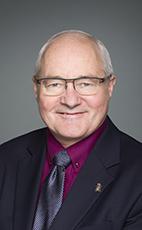Mr. Speaker, it is a pleasure for me to speak to Bill S-14. The bill would recognize Sir John A. Macdonald, who was born on January 11, 1815, and Sir Wilfrid Laurier, who was born on November 20, 1841. They should be recognized; one English, our first prime minister, and one French, our first French prime minister.
These leaders built far better than they knew. They took a country of regions where there was a natural north-south pole and forged it together into a very strong east-west unity. That was felt impossible at the time. There are many today who still think it is very difficult to do. However they forged together what has been recognized many times as the best country in the world and the best place in which to live.
They built the railways against great financial odds and tremendous geographic natural difficulties. Last spring I had the opportunity to travel by rail through the mountains from Vancouver to Edmonton along with many of my colleagues who were on the Canada-U.S. parliamentary association. My American and Canadian colleagues talked a lot about the history of the railroad. We could see by looking at the rails that were placed through the mountains some hundred years ago the tremendous amount of difficulty that must have been faced by the people to link the country from coast to coast.
As leaders of the country they rose above the financial and geographic obstacles which must have been both challenging and risky. These leaders had a lot of inspiration and dedication to stick with it to get the job done. These two prime ministers were very instrumental in the expansion of the west as a result of the building of the railroad and much more .
I was not surprised that the hon. member from the Canadian Alliance who spoke earlier was trying to be a naysayer. We have an opportunity to take a look at our history and build on it. This is not the time to bring in current events.
One of our failings as Canadians is that we often look at the negative. We are very fortunate to live in Canada. It has been recognized as the best country in the world in which to live, but it is much more than that. We live in a very tolerant multicultural society where we have brought two great languages and many other cultures together to build this great country. We have such a great foundation as a result of these leaders.
We should be using the debate today when talking about Macdonald and Laurier to build on our past and to talk about how wonderful it was. The hon. member for Sackville--Musquodoboit Valley--Eastern Shore talked about there not being enough history taught in our schools. That is absolutely true. There is not enough history taught in our schools. If we do not know our history, we will not know where we come from and we will not know where we should be going.
I also comment on the points raised by the Bloc that we were naming two but that the rest of the heroes were not being mentioned.
There were many heroes in the country. It is important to recognize these two men because they consolidated the inspiration to put the country together, to tie it from coast to coast to coast, and to build on that foundation, giving the opportunity to past leaders and current leaders to build the kind of country that we have today.
I understand the Bloc's point of view in terms of the tactics it uses of confusing history because it makes the cause for separatism that much easier. However it is important to name these two leaders because it allows us to build on our history, to recognize the great leaders of our past, and to give high school and university students the opportunity to use these days when they are named to further study these and other leaders from our past and what they did to build the country.
People often look at the calendar, including myself and I expect others in the House as well, and ask why that day is there. A study was done to determine why the day should be recognized. As a result we have a better knowledge and understanding of our history and of these two leaders in Canada's past.
It is very important for all members of the House to support Bill S-14. As Canadians we have not given enough recognition to the leaders of our past and we have not studied enough of our history. We have not recognized the difficulty of building a nation, the inspiration of these two leaders and the difficulties they experienced in forging the ties to build the kind of country we have today.
With the passage of Bill S-14 these two days would be catalysts that Canadians could use to study our history, learn more and as a result become better Canadians because of it.

